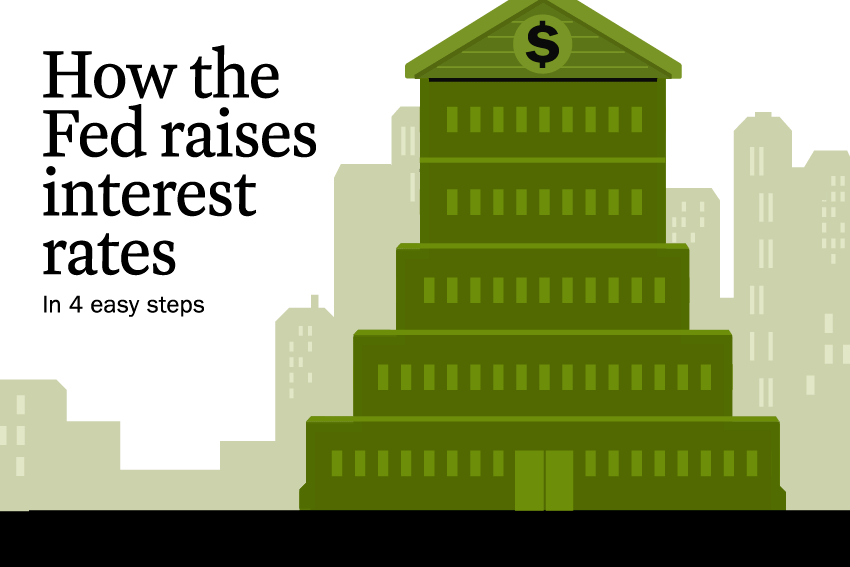Investors will complain. Markets will react. But America’s central bankers are doing the right thing to raise interest rates Wednesday. Here’s why.
There’s nothing more the central bank can do to goose the real economy.
This is the fundamental thing to understand: The Fed is extremely powerful, but it can only stimulate demand; it can’t create it out of thin air.
The reason that the Fed’s program of quantitative easing and low rates has done so much for asset prices — which are near record highs in many categories — but much less for the well-being of Main Street consumers is simple: Throwing a lot of money into financial markets and encouraging people to take on debt will, by definition, raise asset prices. Putting more money and leverage into the system always does that.
But the Fed can’t create new inventions that result in real world jobs, or factories that employ people here in the U.S., or more skilled workers to populate them. That only happens at the ground level. The Fed isn’t in charge of that – politicians and businesspeople are – and we need to cut the morphine drip of easy money that has made us believe it could be otherwise.
It’s possible the markets will correct after the rate hike. But that’s not a bad thing either.
The last time the Fed hiked interest rates, back in 2006, Main Street was actually doing better than Wall Street (as measured by workforce participation, compared to a weighed index of asset prices in major markets). This time around, there’s never been a bigger divide. Wall Street is doing better than ever before in history, while Main Street’s workforce participation is as low as it’s been since the 1970s.
Eventually, all things revert to the mean. If the Fed were to delay a rate hike and let the market bubble continue to brew — and the disconnection between finance and the real economy to grow — it would only mean more pain for all of us later.

Rates are going to rise slowly. That means there’s still a chance to have a real conversation about tax reform that would favor equity over debt.
One of the reasons that we still have a record amount of debt in the global economic system ($57 trillion more than before the financial crisis) is because we have a tax code that subsidizes it. We need a tax code that rewards savers rather than borrowers.
That will mean giving up deductions for interest payments on McMansions. But it would also mean a financial system that isn’t structurally set up to reward risk and brew dangerous bubbles every five to 15 years. As interest rates go up, debt will get more expensive and painful, and nobody will want to talk about taking away tax deductions for it. The time to have the tax reform conversation is now. The Fed’s indication that rates will rise slowly is giving us our last, best breathing room to reform our tax system.
A more prolonged period of low interest rates will make it even harder for many of us to retire.
As a new S&P study shows, multiple years of low rates means that anyone who has had their money in fixed income products now needs a seven figure 401(k) to retire, assuming even a modest yearly payout. Savers have given up trillions of dollars in interest payments, while stock prices (buoyed by the Fed rather than fundamentals) have soared. This isn’t desirable — or sustainable.
Corporate America needs to figure out how to create real, sustainable economic growth.
A rate hike that officially ends the sugar high of easy money and the easy stock spikes that come with it is just the kick in the pants that the private sector needs.
Nearly every smart investor I know thinks that equity prices have been disconnected from the real world for some time now. Yet when CEOs can just take on low interest debt and do buybacks to kick up their share prices — as has been the case thanks to the last few years of monetary policy — there is little impetus to invest in the Next New Thing, let alone workers. That’s why you have lower research and development spending relative to stock buybacks as well as stagnant wages. This isn’t a sustainable paradigm. We need a private sector focused on business models that create real economic growth, not goosing share prices.
None of this is to say that Janet Yellen and the other Fed governors haven’t done the right thing by trying to buoy the real economy in lieu of fiscal stimulus from Congress or more responsible corporate governance (meaning a focus on the long term rather than the quarter) in the private sector. But they can’t do any more to help. The party has been over for some time. It’s time to turn off the music.
More Must-Reads From TIME
- The 100 Most Influential People of 2024
- Coco Gauff Is Playing for Herself Now
- Scenes From Pro-Palestinian Encampments Across U.S. Universities
- 6 Compliments That Land Every Time
- If You're Dating Right Now , You're Brave: Column
- The AI That Could Heal a Divided Internet
- Fallout Is a Brilliant Model for the Future of Video Game Adaptations
- Want Weekly Recs on What to Watch, Read, and More? Sign Up for Worth Your Time
Contact us at letters@time.com